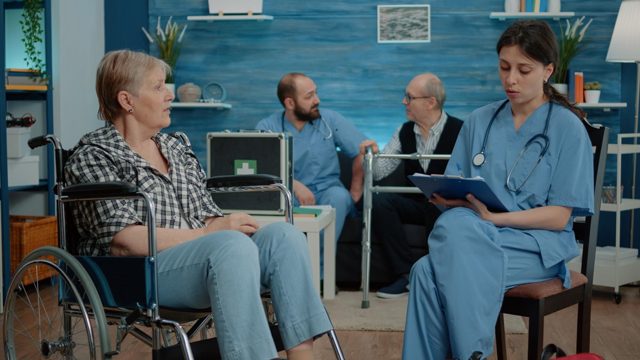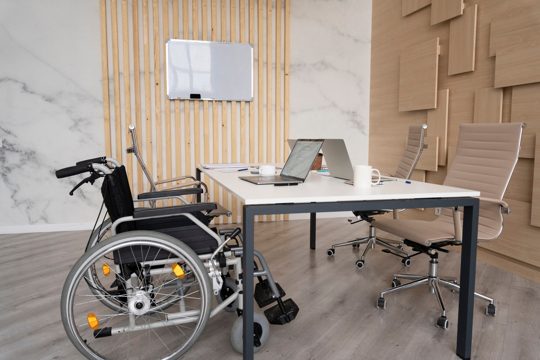What Is Assisted Living?
Assisted living is a type of residential care for older adults who may require help with daily activities but do not need the intensive medical and nursing care provided in a nursing home. It is a long-term care option that combines housing, support services and health care, as needed.

This care setting provides an ideal solution for seniors who wish to maintain a level of independence, but require assistance for certain tasks. The goal of assisted living is to provide a safe and comfortable environment for seniors, while also offering necessary support and services.
The Benefits of Assisted Living
Assisted living presents a multitude of advantages for elderly individuals. This arrangement provides a communal environment with an emphasis on preserving the independence of its residents without compromising their safety. In this setting, seniors are provided with personal care and help with their medications.

They are also served meals and engaged in various social and recreational activities. This fosters a lifestyle that upholds a high standard of living.
Types of Assisted Living Facilities
There is a broad range of assisted living facilities in terms of the services provided and their architectural design. Some of these facilities may be integrated into expansive retirement communities.

Conversely, others may be more modest, taking the form of residential homes. Their structures can vary from towering high-rise edifices to repurposed Victorian residences.
Additionally, they can be found in various locations, including vast campuses in suburban environments.
Services Provided In Assisted Living Communities
Assisted living communities provide a wide array of services to ensure the comfort, safety, and health of their residents. These services typically include 24-hour supervision and security, assistance with daily activities, health and wellness programs, and housekeeping.

Additionally, they offer transportation services, recreational activities, and access to medical services. The aim is to provide a comprehensive solution for seniors who need assistance with daily tasks but want to maintain a certain level of independence.
Private living quarters
One of the key features of assisted living is the provision of private living quarters for residents. These living quarters can range from a single room to a full-sized apartment, complete with a kitchenette and a private bathroom.

The design of these living quarters is meant to offer a homely environment while ensuring the safety of the residents. It allows residents to enjoy their privacy and independence while having immediate access to assistance when necessary.
Home maintenance, repairs and landscaping
Assisted living facilities take care of all home maintenance, repairs, and landscaping tasks. This means that residents no longer have to worry about the burdens and risks associated with these tasks.

This includes everything from fixing a leaky faucet to mowing the lawn or shoveling snow. The aim is to allow residents to enjoy their time and engage in activities they love, without worrying about home maintenance tasks.
Cost of Assisted Living
The cost of assisted living varies greatly depending on the level of care required, the type of residence, and the geographic location. Some facilities charge a flat rate that covers all services, while others offer a base rate with added costs for additional services.

It's important for families to thoroughly understand the cost structure of an assisted living facility before making a decision. Financial planning and understanding of potential funding sources can help ensure affordability of this care option.
Assessment and Admission Requirements
Before admission into an assisted living facility, a comprehensive assessment is usually conducted to determine the level of care required. This assessment typically includes a review of the prospective resident's health history, physical abilities, cognitive functioning, and personal preferences.

Based on this assessment, a personalized care plan is developed. It's essential to ensure that the facility is capable of addressing the resident's needs before making a commitment.
The Importance of a Homely Environment
Developing a cozy and comforting atmosphere is a crucial element in assisted living. This approach makes the residents feel more at home, easing their shift from independent living. A majority of these facilities strive to create an inviting and unique environment.

They often do this by permitting residents to bring their own furniture and personal belongings. These efforts further contribute to the personalization of the living space, enhancing the residents' comfort.
24-Hour Support and Care
Assisted living boasts a significant feature, which is the provision of round-the-clock support and care. This continuous availability of help is a guarantee that residents always have assistance at their disposal.

This support can be needed for various reasons such as personal care or managing medication. Furthermore, immediate help is also ensured in emergency situations.
Therefore, the nature of this 24-hour support is immensely beneficial for the wellbeing of those in assisted living.
Meal Services in Assisted Living
Assisted living facilities typically provide three meals a day, which are included in the monthly fee. Meals are not only nutritionally balanced but are also designed to cater to the dietary needs and preferences of the residents.

In addition to serving meals in a communal dining room, many facilities also offer the option of dining in the resident's private living quarters. This flexibility allows residents to choose their preferred dining setting.
Health and Wellness Programs
Assisted living greatly values health and wellness programs as they are crucial elements. The main goal of these programs is to foster physical well-being, mental health, and social interaction among the residents.

A range of activities such as fitness classes and memory care activities are included. Art therapy and musical events are also part of these programs.
Additionally, they incorporate social outings and other similar engagements.
Social and Recreational Activities
Assisted living facilities provide a range of social and recreational activities to keep their residents engaged and stimulated. These activities can range from book clubs and gardening clubs to movie nights and field trips.

Participating in these activities provides residents with opportunities to socialize, learn new skills, and engage in hobbies and interests. This contributes to a sense of community and enhances the overall quality of life for residents.
Access to Medical Services
Assisted living greatly values the provision of medical services. A majority of these institutions employ a health care team, which typically includes nurses and physical therapists. These professionals are responsible for routine health monitoring and providing necessary medical attention.

Additionally, some of these facilities have established collaborations with local hospitals and clinics. This is to ensure residents have access to specialized care when required.
Transportation Services
Assisted living facilities usually offer transportation services. These services are designed to facilitate residents' mobility.

They enable residents to keep their medical appointments promptly. Moreover, they help them to go shopping, visit nearby attractions, and take part in activities outside the facility comfortably.
Therefore, such services greatly enhance the ease of residents' off-site engagements.
Safety and Security Features
Assisted living facilities prioritize safety and security above everything else. Various features are installed within these facilities for the protection of the residents, including emergency call systems and smoke detectors.

They also have secure entrances and exits designed for the residents' safety. Furthermore, the staff in these facilities are well-prepared to manage emergencies.
They also have adequate training to deal with any unforeseen situations.
Personal Care Services
Personal care services are a critical component of assisted living. These services may include assistance with bathing, dressing, grooming, toileting, and mobility.

The level of assistance provided will depend on the individual's needs and preferences. The goal is to help residents maintain their dignity and independence while ensuring they receive the care they need.
Assisted Living vs. Nursing Homes
While both assisted living and nursing homes provide care and services for seniors, there are significant differences between the two. Assisted living is designed for seniors who need some help with daily tasks but are still relatively independent.

On the other hand, nursing homes are for individuals who require a higher level of medical care and personal assistance. It's important for families to understand these differences when considering care options for their loved ones.
Choosing an Assisted Living Facility
Selecting an assisted living facility is a significant choice that demands thorough deliberation. The decision should be based on factors such as the facility's location, size, price, and the services it provides. The general environment of the community is also crucial.

Essential steps include visiting the facility personally, interacting with staff and residents, and inquiring about its license and inspection history. These factors will help ensure the right choice is made.
The Future of Assisted Living
The future of assisted living looks promising, with continuous advancements in technology and care practices. There's a growing focus on person-centered care, where services are tailored to the individual's needs and preferences.

Additionally, technologies like telehealth and remote monitoring are being integrated into care practices, enabling more efficient and effective care delivery. As the needs and expectations of seniors evolve, assisted living facilities are adapting to meet these changes.
About us
Welcome to SeniorCaresHub! Welcome to our comprehensive senior care destination! We pride ourselves on being a trusted resource for all things related to caring for aging loved ones. We understand the unique needs and challenges that come with senior care, and our mission is to provide you with the information, resources, and support you need to confidently navigate this journey and help you provide the best possible care for your aging loved one.

